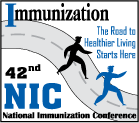
|
|
CDC NIP/NIC Home Page
|
Tuesday, March 18, 2008
242
An Effective Early Childhood Immunization Program: One Community's Fifteen Year Experience
Mardy Sandler1, Sharon G. Humiston1, and Peter G. Szilagyi2. (1) Social Work, Univ. of Rochester, Strong Memorial Hospital, 601 Elmwood Ave, Rochester, NY, USA, (2) Department of Pediatrics, University of Rochester, 601 Elmwood Ave, Box 777, Rochester, NY, USA
Learning Objectives for this Presentation:
By the end of the presentation participants will be able to:
(1)Identify critical components of an evidence based, tracking-recall - outreach program (TRO), (2)Identify challenges to sustaining a TRO program, and (3)Identify strategies to overcome program challenges.
Background:
This successful project has made and sustained gains in childhood immz rates for 15 years. Initially funded by the CDC, the project has expanded to cover approximately 80% of the community's poor infants & toddlers.
Setting:
Ten inner –city primary care practices in Rochester, NY
Population:
Primarily urban, African American and Latino children, 0-2 years who qualify for Medicaid or SCHIP.
Project Description:
Project workers are stationed in primary care practices to track immzs for all children 0-2yrs Children behind in immunizations are offered a tiered intensity of services (reminder/recall, outreach) until all recommended immunizations are received. Services include phone calls, letters, and home visits. A core team of physicians and social workers guides the project centrally and meets regularly with practices, insurers, and IIS to identify continuous process improvements and review outcomes. The program is funded by insurers wanting to sustain high HEDIS scores and integrated health systems.
Results/Lessons Learned:
The intervention initially raised coverage by 20% & has been shown to nearly equalize coverage among city/suburban children and among black/Hispanic/white children, and has sustained high inner-city immz rates although with some practice-level fluctuations. Despite excellent results, this program is in constant jeopardy of being displaced by the health issue of the day. Practices that serve poor children contend with fiscal crises, staff turnover, providers in training, and limited technology. The careful selection of workers, a dedicated core staff, buy-in from practices and shared funding have worked to sustain this program. At a cost of $4/ child/month, the project has maintained a 20-25% improved immunization rate for poor city children over time.
See more of Exhibit and Poster Viewing Session (and Break)
See more of The 42nd National Immunization Conference (NIC)
See more of The 42nd National Immunization Conference (NIC)